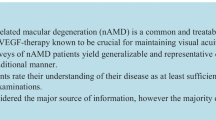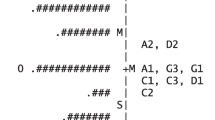Summary
Background
Age-related macular degeneration (AMD) is a disease with rising prevalence. This study evaluates patients’ knowledge and the need for more patient information.
Methods
271 patients with AMD were asked to complete a questionnaire concerning their knowledge about AMD. 150 patients were interviewed by a physician and 121 patients completed the questionnaire on their own.
Results
79.4 % of patients had previous knowledge about AMD. Most patients, 97.3 %, got their information from physicians. 58 % of patients find their knowledge concerning AMD adequate. Only 23.9 % knew about aid organizations for patients with visual impairments.
Discussion
Though the majority of patients had good knowledge concerning AMD, there was a large percentage of patients who seemed to lack information. Physicians should actively ask their patients if they have any questions related to their disease. Medial focus on AMD and information about aid organizations could help patients to cope with their disease.
Conclusion
A large number of patients seemed to need additional information. We suggest that ophthalmologists provide general information concerning AMD to their patients every 3 to 5 years. Information about aid organizations specializing in visual impairment could also be provided. Well-informed patients would be better able to follow their physician’s instructions and would have a better understanding of their disease, particularly for the sake of therapy.
Similar content being viewed by others
References
Fine SJ, Berger JW, Maguire MG, et al. Age-related macular degeneration. New Eng J Med. 2000;342:483–92.
Klein R, Peto T, Bird A, et al. The epidemiology of age-related macular degeneration. Am J Ophthalmol. 2004;137:486–95.
Schmidt-Erfurth U, Augustin A. Augenheilkunde, 3rd ed. Berlin Heidelberg: Springer; 2007., pp 339–400.
Friedman D, O’Colmain B, Beatriz M, et al. Prevalence of age-related macular degeneration in the United States. Arch Ophthalmol. 2004;122:564–72.
Korb C, Kottler U, Wolfram C, et al. Prevalence of age-related macular degeneration in a large European cohort: results from the population-based Gutenberg Health Study. Graefes Arch Clin Exp Ophthalmol. 2014;252(9):1403–11. doi:10.1007/s00417-014-2591-9.
Rudnicka AR, Kapetanakis VV, Jarrar Z, et al. Incidence of late stage age related macular degeneration in American whites: systematic review and meta-analysis. Am J Ophthalmol. 2015;160:85–93e3. doi:10.1016/j.ajo.2015.04.003.
Pokharel S, Malla OK, Pradhananga CL, et al. A pattern of age-related macular degeneration. JNMA J Nepal Med Assoc. 2009;48:217–20.
Schmidt-Erfurth U, Richard G, Augustin A, et al. Guidance for the treatment of neovascular age-related macular degeneration. Acta Ophthalmol Scand. 2007;85(5):486–94.
Brännlund A, Hammarström A, Strandh M. Education and health-behaviour among men and women in Sweden: a 27-year prospective cohort study. Scand J Public Health. 2013;41(3):284–92. doi:10.1177/1403494813475531.
Altenhöner T, Philippi M, Böcken J. Health behaviour and changes in health behaviour – are education and social status relevant? Gesundheitswesen. 2014;76(1):19–25. doi:10.1055/s-0033-1333729.
Hu Y, Zhang Z. Patient education – a route to improved patient experience in Chinese hospitals? Patient Educ Couns. 2015;98(12):1651–2. doi:10.1016/j.pec.2015.06.015.
Faes L, Bodmer NS, Bachmann LM, et al. Diagnostic accuracy of the Amsler grid and the preferential hyperacuity perimetry in the screening of patients with age-related macular degeneration: systematic review and meta-analysis. Eye (Lond). 2014;28(7):788–96. doi:10.1038/eye.2014.104.
Peng J, He F, Zhang Y, et al. Differences in simulated doctor and patient medical decision making: a construal level perspective. PLoS ONE. 2013;8(11):e79181. doi:10.1371/journal.pone.0079181.
Mares JA, Voland RP, Sondel SA, et al. Healthy lifestyles related to subsequent prevalence of age-related macular degeneration. Arch Ophthalmol. 2011;129(4):470–80.
Tomany SC, Wang JJ, van Leeuwen R, et al. Risk factors for incident age-related macular degeneration: pooled findings from 3 continents. Ophthalmology. 2004;111(7):1280–7.
Schmidt-Erfurth U, Chong V, Loewenstein A, et al. Guidelines for the management of neovascular age-related macular degeneration by the European Society of Retina Specialists (EURETINA). Br J Ophthalmol. 2014;98(9):1144–67. doi:10.1136/bjophthalmol-2014-305702.
Krebs I, Schmetterer L, Boltz A, et al. A randomised double-masked trial comparing the visual outcome after treatment with ranibizumab or bevacizumab in patients with neovascular age-related macular degeneration. Br J Ophthalmol. 2013;97(3):266–71. doi:10.1136/bjophthalmol-2012-302391.
Augustin A, Sahel JA, Bandello F, et al. Anxiety and depression prevalence rates in age-related macular degeneration. Invest Ophthalmol Vis Sci. 2007;48(4):1498–503.
Stocké V. Entstehungsbedingungen von Antwortverzerrungen durch soziale Erwünschtheit: Ein Vergleich der Prognosen der Rational-Choice Theorie und des Modells der Frame-Selektion. Z Soziol. 2004;33(4):303–20.
Mocan N, Altindag D. Education, cognition, health knowledge, and health behavior. Eur J Health Econ. 2014;15(3):265–79. doi:10.1007/s10198-013-0473-4.
Author information
Authors and Affiliations
Corresponding author
Ethics declarations
Conflict of interest
M. Burgmüller, N. Cakmak, B. Weingessel, C. Vécsei, and P. Vécsei-Marlovits declare that they have no competing interests.
Rights and permissions
About this article
Cite this article
Burgmüller, M., Cakmak, N., Weingessel, B. et al. Patient knowledge concerning age-related macular degeneration: an AMD questionnaire. Wien Klin Wochenschr 129, 345–350 (2017). https://doi.org/10.1007/s00508-016-1044-3
Received:
Accepted:
Published:
Issue Date:
DOI: https://doi.org/10.1007/s00508-016-1044-3




